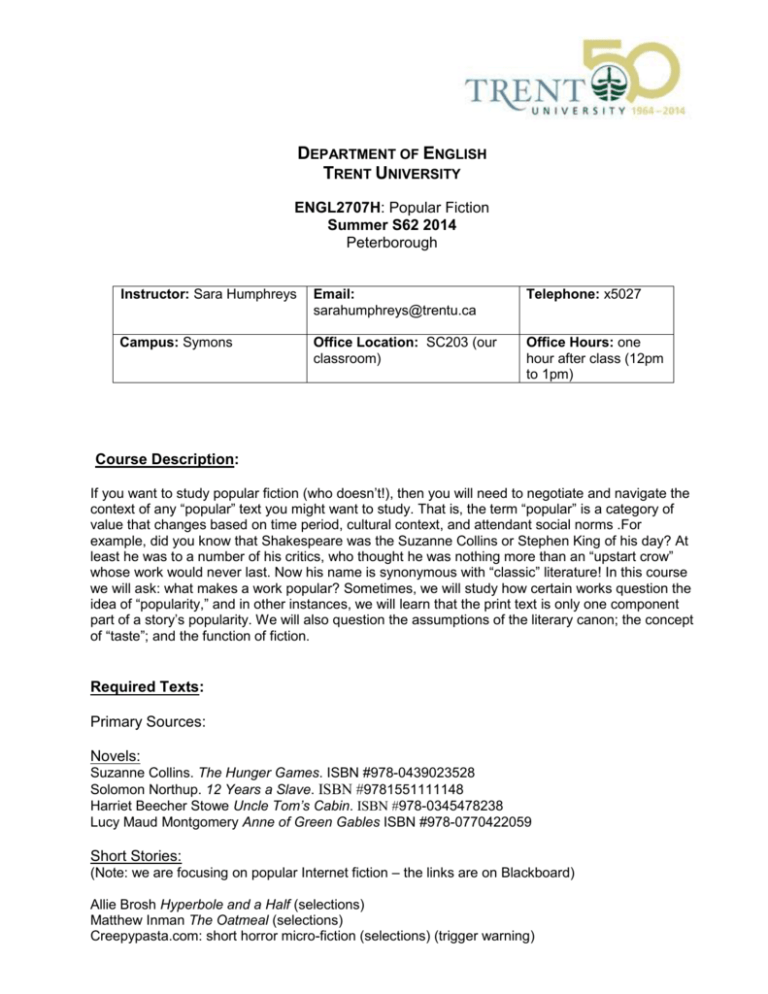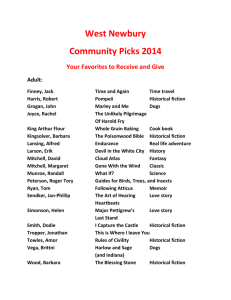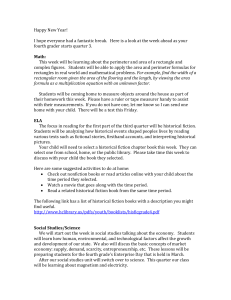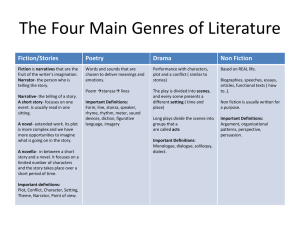Course Outline Winter 2008 Check List
advertisement

DEPARTMENT OF ENGLISH TRENT UNIVERSITY ENGL2707H: Popular Fiction Summer S62 2014 Peterborough Instructor: Sara Humphreys Email: sarahumphreys@trentu.ca Telephone: x5027 Campus: Symons Office Location: SC203 (our classroom) Office Hours: one hour after class (12pm to 1pm) Course Description: If you want to study popular fiction (who doesn’t!), then you will need to negotiate and navigate the context of any “popular” text you might want to study. That is, the term “popular” is a category of value that changes based on time period, cultural context, and attendant social norms .For example, did you know that Shakespeare was the Suzanne Collins or Stephen King of his day? At least he was to a number of his critics, who thought he was nothing more than an “upstart crow” whose work would never last. Now his name is synonymous with “classic” literature! In this course we will ask: what makes a work popular? Sometimes, we will study how certain works question the idea of “popularity,” and in other instances, we will learn that the print text is only one component part of a story’s popularity. We will also question the assumptions of the literary canon; the concept of “taste”; and the function of fiction. Required Texts: Primary Sources: Novels: Suzanne Collins. The Hunger Games. ISBN #978-0439023528 Solomon Northup. 12 Years a Slave. ISBN #9781551111148 Harriet Beecher Stowe Uncle Tom’s Cabin. ISBN #978-0345478238 Lucy Maud Montgomery Anne of Green Gables ISBN #978-0770422059 Short Stories: (Note: we are focusing on popular Internet fiction – the links are on Blackboard) Allie Brosh Hyperbole and a Half (selections) Matthew Inman The Oatmeal (selections) Creepypasta.com: short horror micro-fiction (selections) (trigger warning) Film: I will be showing clips from certain franchises and films, and I will post links to the streaming version of these films where possible. However, it is your responsibility to watch these films. Kevin Sullivan Anne of Green Gables (1985) Gary Ross The Hunger Games (2012) Steven McQueen 12 Years a Slave (2013) Secondary Sources: (Note: the books will be placed on reserve in case you want to read the originals and the essay will be posted on Blackboard. The “Notes” comprise the main ideas from these important but challenging theoretical texts) Notes on Pierre Bourdieu’s Distinction: A Social Critique of the Judgement of Taste and The Field of Cultural Production Notes on Theodor Adorno’s and Max Horkheimer’s “The Culture Industry” Notes on Jane Tompkin’s Sensational Designs Notes on Frank Moretti’s “The Slaughterhouse of Literature” Notes on John Fiske’s The Popular Recommended Texts: Please be sure to use the resources on Trent University Academic Skills site (https://www.trentu.ca/academicskills/) to help you with writing and citing. learningSystem/Blackboard: This course uses Blackboard. Please note that you are expected to check Blackboard for videos and other course material on a bi-weekly basis. Course Format: Type Day Interactive Lecture Tues and Thurs Tues and Thurs Time (times are approximate and subject to change) 9:00am to 10:30am 10:30am to 10:40am Tues and Thurs 10:40am to 11:50am Break Seminar/Discussion Groups Location SC203 Wherever you would like to go within 10 to 15 minutes SC203 2 Learning Outcomes: I have developed the course to address several learning outcomes. By the end of the course a successful student should: Have gained an understanding of the relationship between print culture and popular fiction Have an understanding of how popular narratives transform across contexts and histories Have a sense of the arbitrary nature of cultural value and production Have been exposed to theories about taste and cultural capital Have explored models of reading and reading publics and look closely at more recent developments like fan fiction communities and franchises Have addressed the role of evolving technologies in shaping the production and consumption of popular fiction Have explored the material culture that springs up around blockbusters and bestsellers Course Evaluation: Normally at least 25% of the grade in an undergraduate course must be determined and made available by the final date for withdrawal. Final date for withdrawal for summer 2014; summer term 2 is July 17th. No final examination is worth more than 50% of the final grade. Type of Assignment (e.g, test, essay, lab report, etc. and provide an explanation for each ) Seminar Journals Weighting Due Date 3 x 10% In-Class Essay Project proposal Final project Take Home Exam 15% 10% 25% 20% July 3rd, July 15th, July 29th July 10th July 17th July 31st August 3rd Seminar Journals: In this short paper, you are invited to expand on one question or discussion from the seminar period. These are to be posted on Blackboard in the “journals” section of the site. In-Class Essay: A type of free-writing exercise to test how well you can use the terminology and concepts related to the study of popular fiction. Project Proposal: A short paper that offers you the opportunity to explore what you want to research and write about for your final project. 3 Final Project: You have three choices: 1. Creative fan fiction blog or paper (which will also include a five page analysis of your creative choices) 2. Blog (more info given in class) 3. 8-10 page paper Week-by-week schedule (Subject to change with as much notice as possible) June 24th: Review of Course Syllabus and Expectations June 26th: What is Popular Culture and Why Should We Care? Lucy Maud Montgomery Anne of Green Gables (bookstore) Notes on John Fiske’s The Popular July 1 is Canada Day = Stat Holiday! July 3rd: Mass-Consumption and the Birth of the Franchise Lucy Maud Montgomery Anne of Green Gables Suzanne Collins The Hunger Games (up to Chapter 15) Notes on Pierre Bourdieu’s Distinction: A Social Critique of the Judgement of Taste and The Field of Cultural Production Seminar journal one July 8th: Remediation or What Films Do that Novels Can’t and Vice Versa Gary Ross The Hunger Games Kevin Sullivan Anne of Green Gables Notes on Theodor Adorno’s and Max Horkheimer’s “The Culture Industry” July 10th: The Book that Changed the World Part I Harriet Beecher Stowe Uncle Tom’s Cabin In-Class Essay July 15th: The Book that Changed the World Part II 4 Harriet Beecher Stowe Uncle Tom’s Cabin Notes on Jane Tompkin’s Sensational Designs Seminar journal two July 17th: The Material Culture of the Popular Harriet Beecher Stowe Uncle Tom’s Cabin Lucy Maud Montgomery Anne of Green Gables Suzanne Collins The Hunger Games Proposal Due July 22nd: The Canon and the Popular: Categorical Problems Notes on Frank Moretti’s “The Slaughterhouse of Literature” Solomon Northup 12 Years a Slave July 24th: Revising the Popular: Counter-Narratives Solomon Northup 12 Years a Slave Steve McQueen 12 Years a Slave July 29th: Where is Popular Short Fiction? Online Allie Brosh Hyperbole and a Half (selections) Matthew Inman The Oatmeal (selections) Creepypasta.com: short horror micro-fiction (selections) Seminar journal three July 31st: Groundhog Day Course review and take home exam handed out Final Project Due Department and/or Course Policies: Late Policy and Extensions: Late papers and extensions are dealt with on a case by case basis. The penalty for late assignments is 5% per day, so please consult with the instructor if you think your assignment might be late. 5 Attendance: The course policy regarding attendance is clear and unambiguous: it is your responsibility to show up for class fully prepared. Further, it is your responsibility to read this syllabus carefully and understand the course expectations and deadlines. E-mail: I return email within 48 hours, excluding weekends and holidays. University Policies Academic Integrity: Academic dishonesty, which includes plagiarism and cheating, is an extremely serious academic offence and carries penalties varying from a 0 grade on an assignment to expulsion from the University. Definitions, penalties, and procedures for dealing with plagiarism and cheating are set out in Trent University’s Academic Integrity Policy. You have a responsibility to educate yourself – unfamiliarity with the policy is not an excuse. You are strongly encouraged to visit Trent’s Academic Integrity website to learn more: www.trentu.ca/academicintegrity. Access to Instruction: It is Trent University's intent to create an inclusive learning environment. If a student has a disability and/or health consideration and feels that he/she may need accommodations to succeed in this course, the student should contact the Student Accessibility Services Office (SAS), (BH Suite 132, 705-748-1281 or email accessibilityservices@trentu.ca). For Trent University in Oshawa Student Accessibility Services Office contact 905-435-5102 ext. 5024. Complete text can be found under Access to Instruction in the Academic Calendar. 6







